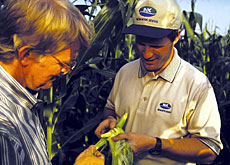US authorities fine Syngenta over Bt10

Agrochemicals firm Syngenta is to pay a fine of $375,000 (SFr449,475) for contaminating seeds with an unapproved variety of genetically-modified corn.
The United States Department of Agriculture (USDA), which imposed the fine, also ordered the Basel-based company to develop a training programme to prevent another occurrence.
The European Food Safety Authority has said the Bt10 corn contains an antibiotic-resistant gene that it believes should not be present in crops grown commercially.
But Syngenta says the gene is inactive in Bt10 and therefore does not pose any danger to human health.
Syngenta admitted last month that some of its corn seeds were mistakenly contaminated between 2001 and 2004 with Bt10, an insect-resistant strain that was not approved for US distribution.
The seeds were later sold to farmers in the US and Europe, the US government said.
Regrettable mistake
The company said that although the misidentification was a “regrettable mistake”, there was no risk to consumers, public health or the environment.
“While the amount of Bt10 corn that was mistakenly supplied represents an extremely small quantity, we fully accept and will abide by the USDA’s decision and requirements,” commented Mike Mack in a company statement.
The European Commission on Friday pressed for more information on genetically-modified imports.
Under European Union rules, all biotech crops must be approved by the commission, the EU’s executive, and be properly labelled and traceable. But officials believe unauthorized shipments of Syngenta’s Bt10 have been coming in since 2001, unleashing new calls for a ban on the use of all biotech crops in Europe.
The corn is produced in the US, where biotech crops have won wide acceptance. Europeans, in contrast, have remained wary about genetically-modified crops.
The commission last week requested Syngenta to provide information on BT10 – specifically the crop’s molecular makeup – to ensure officials could detect and remove the variety from circulation.
No information
But EU spokesman Philip Tod told reporters on Friday that the commission had “regrettably not received” information from Syngenta.
Tod said the EU would have a “clearer picture of the situation” if other batches of the Bt10 corn variety were still in circulation or use in Europe, after EU experts hold an information meeting next Tuesday to prevent further imports.
Tod said EU officials were cooperating with federal regulatory agencies in the US to stop any further imports. Those US agencies are also investigating the unauthorized sales of Bt10 in the US.
Tod said around 10 kilograms of Bt10 seeds were imported into Spain and France for research purposes, but were later destroyed. About 1,000 tons of food and feed products containing the corn are thought to have entered the food chain in Europe since 2001, the Commission has said.
Bt10 contains proteins that are identical to the proteins in Syngenta’s Bt11 crop, which has been approved in both the EU and the US.
swissinfo with agencies
Syngenta is the world leader in crop protection and ranks third in the commercial seeds market.
The company makes products that help farmers fight weeds, fungi and pests.
It was formed in 2000 by the merger of the agrochemicals divisions of AstraZeneca and Novartis.
It employs about 19,000 people in more than 90 countries.
Net profit in 2004 after exceptional items soared by 84 per cent to $460 million (SFr559.1 million).
Syngenta mistakenly sold Bt10 seeds instead of Bt11 between 2001 and 2004. They could have been planted on about 15,000 hectares (37,000 acres).
This equates to one-one hundredth of one per cent (0.01 per cent) of the annual total US acreage.
The US exports 18 per cent of its corn and a small quantity could have found its way to other countries, Syngenta says.
According to Syngenta, the proteins expressed by Bt10 and Bt11 are identical. Bt11 may be used in the EU as fodder.
But the Swiss Federal Health Office says that there is no approval worldwide for Bt10.

In compliance with the JTI standards
More: SWI swissinfo.ch certified by the Journalism Trust Initiative



You can find an overview of ongoing debates with our journalists here. Please join us!
If you want to start a conversation about a topic raised in this article or want to report factual errors, email us at english@swissinfo.ch.